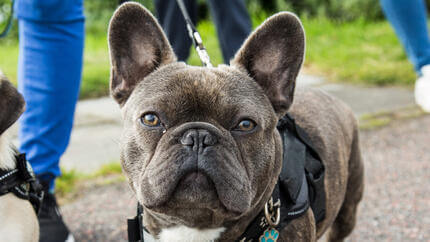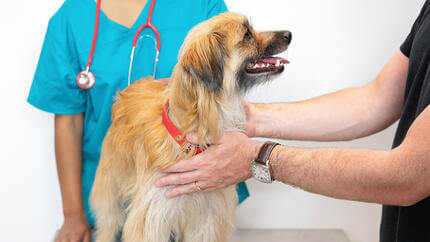

Golden Retrievers are one of the most popular dogs in the entire world. Their happy-go-lucky personalities coupled with their soft, fluffy coat and adorable smiling faces makes them a firm favourite with adults and families alike. Not to mention they’re also incredibly intelligent, so they’re also often seen performing important jobs such as guiding, detection and even search and rescue.
If you’re thinking about adding this breed to your household, you’ll probably be wondering about the possible Golden Retriever health problems. Keep reading to find out which issues this breed is most commonly predisposed to and how to avoid them if you can.
Golden Retriever health problems
This breed is classed as ‘category two’ by the UK Kennel Club which means they have some points of concern that need to be kept an eye on. These points are features which may affect the overall health of the breed in the future if exaggerated.
Hip and elbow dysplasia
Hip and elbow dysplasia are two of the most common Golden Retriever health issues. Hip dysplasia occurs due to abnormal growth or development of the ball and socket of their hip – this may be that the socket is too shallow, the ball is too big or the ligament is too weak.
Elbow dysplasia can affect just one or both elbows and it’s also caused by abnormal development. There are three main areas in the elbow that can be affected and some dogs may just have one, where others may develop a combination.
Hip and elbow dysplasia are problems which may only be noticeable as your dog grows older and you start to notice limping or stiffness and a reluctance to go for walks and play. It’s easy to chalk this up to just them getting older, but it’s important if you notice these signs to take them to the vet as soon as possible as if left untreated, it can cause the joint to degenerate which is very painful. Treatment may include orthopaedic surgery, medication and ongoing therapy such as hydrotherapy and physiotherapy.
In order to reduce the risk of this Golden Retriever health problem, you should always ensure you purchase puppies from reputable breeders. Many will actually have both parents screened against joint issues and will have written certifications of their joint health.
Eye problems in Golden Retrievers
Golden Retrievers are predisposed to a number of eye problems. It’s extremely important that you keep a close watch on your dog’s eye health and ensure that you take them for yearly vet check-ups.
Glaucoma
Glaucoma is a very painful eye issue which if left untreated, can rapidly lead to sight loss. With this condition the cornea (the front part of the eye) tends to turn a blue colour, the whites develop redness and, in some cases, the eye may appear enlarged or bulging.
Cataracts
Cataracts is a common cause of blindness and it usually affects older Golden Retrievers. If caught early, surgery can be an option to cure this issue and restore any sight loss.
Retinal dysplasia
This is a genetic issue which can also be caused by infections and toxin exposure. Retinal dysplasia is caused by an abnormal growth in the back of their eye which reduces their vision and surprisingly, it doesn’t cause pain. Due to the lack of pain, this eye issue often goes unnoticed and diagnosis is usually only made when vision loss has occurred.
Retinal atrophy
Retinal atrophy is another inherited Golden Retriever health problem. This condition causes the degeneration of your dog’s retina and eventually leads to blindness. Sadly, there’s no cure or prevention to this issue.
Skin problems in Golden Retrievers
One of the most endearing qualities of a Golden Retriever is their thick undercoat and long outer fur which makes them very soft and fluffy. Unfortunately, this luscious coat is also the ideal environment for fungi and bacteria to grow, so it’s very important you keep an eye on their skin.
Ichthyosis
One of the most common skin diseases to affect Golden Retrievers is ichthyosis. The signs of this condition include excessively scaly skin and dandruff. Surprisingly, it’s not very itchy so you might not spot them scratching, but it does make them more susceptible to developing secondary skin infections. Treatment tends to include vet prescribed shampoo to keep the skin clean and provide additional moisture.
Ear infections in Golden Retrievers
As Golden Retrievers have floppy ears, they tend to be more predisposed to getting ear infections. It’s important to regularly check their ears and clean them when necessary with an appropriate, dog-friendly solution. If you spot any discharge from the ear or if it seems hot, red or itchy, go to the vets as soon as possible.
Cancer in Golden Retrievers
Sadly, Golden Retrievers have one of the highest cancer rates among all dog breeds with around 60% of deaths being due to this. This high rate may be partly due to the fact they tend to have longer lifespans, but it’s important to remember that cancer can occur at any age. The most common types of cancers to affect Golden Retrievers are:
- Hemangiosarcoma
- Lymphoma
- Mast cell tumours
- Osteosarcoma
Make sure to buy puppies from reputable, registered breeders, and keep an eye out for any symptoms of cancer in dogs, including growths and lumps.
Hypothyroidism in Golden Retrievers
Hypothyroidism is another Golden Retriever health problem which may affect them at any age, but it’s most common between 4-10 years. This condition is where the body doesn’t make enough thyroid hormones which are responsible for controlling their metabolism. Signs may include hair loss, dull coat, thinning, blackened skin, lethargy, weight gain and reluctance to exercise. If you have a dog with this condition, they’ll need to take ongoing medication for the rest of their lives.
Preventing Golden Retriever health issues
The above-listed Golden Retriever health issues are just conditions that they’re predisposed to – there’s no guarantee they’ll get them, they’re just more at risk. In order to reduce the possibility of your dog developing these problems, it’s imperative that if you’re purchasing a puppy, do so from a reputable breeder. Responsible breeders will screen their dogs prior to breeding to ensure they don’t carry poor genes, making sure pups are healthy and given the best possible start to life.
Want more info on breed-specific health concerns? Read our guide on common Labrador health problems, next.
Related articles













